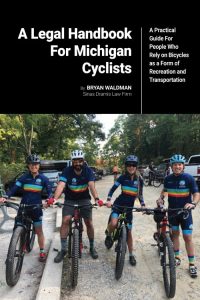Michigan Bicycle Accidents & No-Fault PIP Benefits
The Michigan No-Fault Act provides for the payment of certain guaranteed benefits to all people injured in an incident that involves a motor vehicle, regardless of who was at fault. A bicycle is not considered a “motor vehicle” and for this reason, an injured cyclist will not be entitled to benefits unless the injury arises from the operation or use of a motor vehicle. It is important to note that actual physical contact between a bicycle and a motor vehicle is not required, provided that the operation of the motor vehicle was a significant factor in causing an injury to the cyclist. However, if a cyclist sustains an injury as a result of a collision with another cyclist, a road defect, or simply losing control of his/her bicycle, the cyclist is not entitled to recover no-fault insurance benefits under the Michigan No-Fault Act.
Since a large percentage of cycling injuries, and particularly the most serious injuries, are caused by motor vehicle/bicycle collisions, it is important to understand some basic concepts of the Michigan no-fault law.
No-Fault Benefits for Bicyclists
Under the no-fault statute, an automobile accident victim has the right to recover certain benefits, regardless of who caused the accident. There are four (4) basic types of no-fault benefits payable under the Michigan No-Fault Act:
Allowable Expenses
An injured person is entitled to recover “allowable expenses” consisting of “all reasonable charges incurred for reasonably necessary products, services, and accommodations for an injured person’s care, recovery, or rehabilitation.” These benefits include medical expenses, in-home attendant care or nursing services, handicap-accessible accommodations, room and board expenses, rehabilitation expenses, special or handicap-accessible transportation, mileage to and from healthcare appointments, and guardian expenses. These benefits are currently payable for life and are payable without regard to any type of “cap” or “ceiling.”
However, beginning in the spring of 2020 due to Michigan’s auto no-fault reforms, Michigan residents will have the option of purchasing auto insurance policies without lifetime allowable expense coverage. There will be options of allowable expense coverage capped at $500,000, $250,000, and some may even qualify for $50,000. Additionally, some people will have the option of not purchasing allowable expense insurance coverage. These new, limited allowable expense policies will take effect on July 2, 2020.
Wage Loss Benefits
When a person is injured in an automobile accident and cannot work as a result of their injuries, they are entitled to receive wage loss benefits, which are calculated at a rate of eighty-five percent (85%) of the injured person’s gross pay for up to three (3) years. Additionally, under the statute, work loss benefits cannot exceed a monthly maximum, which is adjusted in October of each year to keep pace with the cost of living. The wage loss monthly maximum is based upon the date of injury and the applicable monthly maximum rate, adjusted each year.
Replacement Services
An injured person may receive benefits as a result of having other people perform domestic-type services that the injured person would have performed, if not for their injuries. However, reimbursement for these services cannot exceed $20.00 per day, and these benefits are only available for up to three (3) years following the accident. Typical examples of replacement services include household chores, such as cleaning, laundry, cutting grass, and shoveling snow.
Survivor’s Loss Benefits
Where a motor vehicle accident results in death, dependents of the decedent are entitled to recover survivor’s loss benefits and funeral and burial expenses. Survivor’s loss benefits are payable for three (3) years and are comprised of several components, which include after-tax income, lost fringe benefits, and replacement service expenses. Additionally, survivor’s loss benefits are subject to the same statutory monthly maximum applicable to work loss benefits.
Can I recover no-fault benefits if I don’t have an auto insurance policy?
Typically, an injured person will receive no-fault benefits from his/her own no-fault insurance company. If a cyclist does not own an automobile or have auto insurance, they may receive no-fault benefits from the insurer of their spouse or any relative with whom they reside. If the injured person does not have a no-fault insurance policy and does not live with a relative who has a no-fault insurance policy, then a cyclist will receive his/her benefits from the Michigan Department of State, Assigned Claims Facility. This is a government office that has been established as the last resort for auto accident victims to receive no-fault benefits. Claims for no-fault benefits made through the Assigned Claims Facility will have allowable expenses capped at $250,000.
The Michigan no-fault is far too complicated to fully explain here. Please contact our attorneys for more information regarding bicyclist rights to no-fault benefits.
In addition to a claim for no-fault benefits, an injured cyclist may also have a tort or liability claim if another person or party is at fault and/or their negligence caused the cyclist’s injuries. Damages recoverable in a tort liability claim against at-fault drivers include excess economic damages and non-economic damages, such as pain and suffering.


